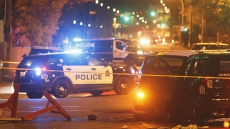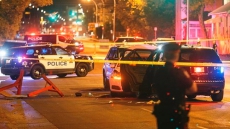Terrorism experts say a poorly-planned attack in Edmonton may be have been inspired rather than directed by Islamic State militants, a type of attack that is difficult if not impossible to prevent.
Police say a man in a car first ran down, then stabbed, an officer outside Commonwealth Stadium during an Edmonton Eskimos football game Saturday night before running away. A few hours later, police chased a suspect driving a U-Haul cube van as it struck four pedestrians downtown.
The officer was not seriously injured but there was no word on the pedestrians. An Islamic State flag was found in the car that hit the officer. A 30-year-old man is in custody.
"I'm not sure how you're going to stop an attack of this nature," said Phil Gurski, a threat consultant in Ottawa and former analyst with the Canadian Security Intelligence Service.
Gurski said it's clear the suspect wasn't very smart since he handed a police officer his driver's licence at a checkstop that connected him with the car that struck the officer, sparking the police chase.
But he said such attacks are "unstoppable terrorism."
"It's impossible to stop unless the person's already on your radar," said Gurski.
Edmonton Mayor Don Iveson called the suspect a "lone wolf," adding "random acts of sick people are difficult to anticipate."
Stephanie Carvin, a terrorism expert at Carleton University, said the attack looked unsophisticated.
"It seems to have been carried out very badly (thankfully) so probably not a mastermind here, folks," she said on Twitter. "But attacks against crowds and sports fans has been a HUGE fear in Canada over the last 18 months. This will not help that."
Edmonton's mega mall and oil industry have raised concerns in the past that the Alberta capital might be a terrorist target.
In 2015, the RCMP investigated a reported video from Al-Shabab that appeared to urge Muslims to attack shopping malls in western countries, including the West Edmonton Mall. Three years earlier, the federal government set up a counter-terrorism unit in the province to protect the energy industry from possible extremist attacks.
Amarnath Amarasingam, an expert on extremism at the University of Waterloo, said the Edmonton attack appears to be a "fairly typical ISIS-inspired one," although it may be difficult to confirm. The group has recently been sloppy about claiming credit for attacks and is also reluctant to do so when attackers are in custody, he said.
The group has long called on followers to attack wherever in the world they may be, Amarasingam added.
"Any Western city will do, whether in Europe or North America," he said. "For them, it's about sowing fear, turning communities against one another, and creating the impression that they are everywhere."
The leader of the Islamic State recently released an audio message reiterating the need for attacks in the west, especially on military members or police officers of NATO countries, said Edmonton security consultant David Jones.
Jones said it wasn't a coincidence the officer was stabbed outside the football stadium, which was also hosting a military appreciation night.
Canada's spy agency views terrorist acts at home as a "constant" threat, according to a briefing note prepared last November for Michel Coulombe, then-director of CSIS.
"The principal terrorist threat to Canada remains that posed by violent extremists who are inspired to carry out an attack in Canada," reads the document obtained by The Canadian Press under Access to Information legislation.
"Terrorist activity can be sudden or spontaneous, or in some cases, take months or years in planning and logistics."
The document also said CSIS is studying "behavioural indicators" that suggest an individual is moving from holding extremist ideas to taking action — whether it's travelling abroad, supporting others who plan to commit terrorist acts or plotting an attack in Canada or elsewhere.





